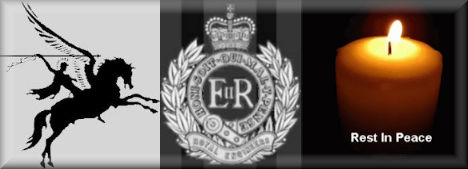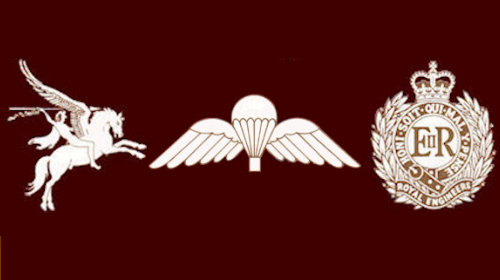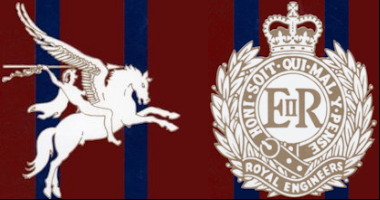
Roll of Honour
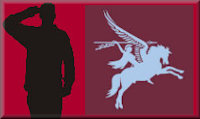
Colonel EC O'Callaghan MC MBE - Born 5th January 1923: Died 25th May 2003
As his name suggests, Eric O'Callaghan was of Irish extraction but he was born and raised in Gosport. Clearly, though, his ancestors' genes were present in him in full measure for he lacked for nothing in courage, he sought —and found — lots of adventure and he was always up for a party!
Like so many of his contemporaries, the Second World War coincided with Eric's adolescent urge to fill every Kipling 'minute' with 'sixty seconds' worth of action. The War started whilst he was still as school and he volunteered for the Army as soon as he was eighteen. He was commissioned into the Royal Engineers in 1942 and by September of that year he had joined 9th Field Company (Airborne). It was with this unit that he took part in the assault on Sicily in the following July. Like so many other gliders in this operation, Eric's landed too far from his objective for him to be able to reach it in time. Typical of the man, rather than lie hidden until the relieving forces arrived, he decided that it would much more useful if he could create as much disturbance and disorganisation in the enemy lines as possible. He located what turned out to be an Italian battalion headquarters and, with the few soldiers he could muster, he attacked it and caused heavy casualties and confusion. For his courage, resource and initiative he was awarded the Military Cross.
After the capture of Sicily Eric returned to North Africa with 9 Field Company (Airborne), then to Italy before returning to England at the end of 1943 to prepare for the invasion of Europe. On 17th September 1944 he was commanding the 2nd Platoon when they landed in Holland as part of the 1st Airborne Division. Eric's mission was to capture the Railway bridge which was en route to both the pontoon bridge and the main road bridge which crossed the Lower Rhine at Arnhem. On the way to his objective he was astonished to come across a platoon from 2 PARA who, unknown to him, had also been given the same task. Coordinating their attacks, and in the face of direct fire, they succeeded in forcing the enemy to withdraw to the far bank. However, as they arrived at the end of the bridge the centre span was blown. Miraculously none of 2 Platoon was injured by this blast but, clearly, there was now no bridge to capture so Eric followed the sounds of battle. He led his men on and, after a number of excitements on the way, they joined the ranks of a much-depleted 2 PARA at the now-famous Bridge To Far where he and his men played a full and heroic part in the battle for the Arnhem bridge. The deeds of the following days are too numerous to mention here but one unique distinction, which Eric earned, was that of having his nose broken by a dead man! A German NCO crashed through the window of a house that Eric was defending, Eric shot him but, in death, the NCO's momentum landed his boot right on Eric's nose. He bore the misshapen result for the rest of his life. But his luck eventually deserted him and, after three days and nights hard fighting, Eric was wounded in the head and awoke to find himself a prisoner of war. There followed some grim months in German hospitals and camps before he was liberated in April 1945 and he returned to England. For his actions at Arnhem he was mentioned in Despatches.
After recuperation Eric was posted to 1st Airborne Squadron and went with it to Palestine in October 1945 for a hectic and demanding two years, first as a troop commander, then as Adjutant and finally as OC of the Squadron. One memorable tale of his doings there tells of the discovery of a domestic hot water tank, crammed full of explosives and resting on a milk float in a built up area. Eric could not blow it up in situ so he got one of his sappers to drive the milk float to a beach near Haifa while he straddled the bomb, to stop it rolling off, and kept the sweating explosives cool with a watering can. He was awarded the MBE for his gallantry.
On return to UK in July 1948 Eric remained in command of the 1st Airborne Squadron as it absorbed the remnants of 9 Field Company (Airborne) and was re-designated 9 Airborne Squadron. He handed over command of the new Squadron as it departed for BAOR where, subsequently, it also absorbed the remains of 3rd Airborne Squadron to complete the foundation of what is now 9 Parachute Squadron.
Postings in Wiltshire, Chatham, Fort Belvoir, Germany and the War Office followed which continued to satisfy Eric's wanderlust. In the early 1960s the value of his wide experience was recognised by his being appointed Company Commander of Rhine Company at Sandhurst. Affectionately nicknamed Calor Gas (possibly a reference to his loquacity!) he was held in awe and respect by the Officer Cadets. He was determined to have the best Company in the Academy and that ambition was achieved when Rhine won the Sovereign's Company twice during his tenure. Sapper Officer Cadets, including at least one future E-in-C (GWF) had much to thank him for.
After command of a regiment in Cyprus Eric was promoted to Colonel and sent to the Plant, Roads and Airfields Wing at the RSME as Chief Instructor. His reputation for firmness was, by now, well established. However, there was no doubt that this was more than matched by his fairness. On one famous occasion, he upbraided the YO's for being rather dozy one morning as a result of excessive carousing the night before. He then discovered that his own daughter had been one of the guests at the party. Admitting some indirect blame for their debilitated state, Eric immediately withdrew the punishment!
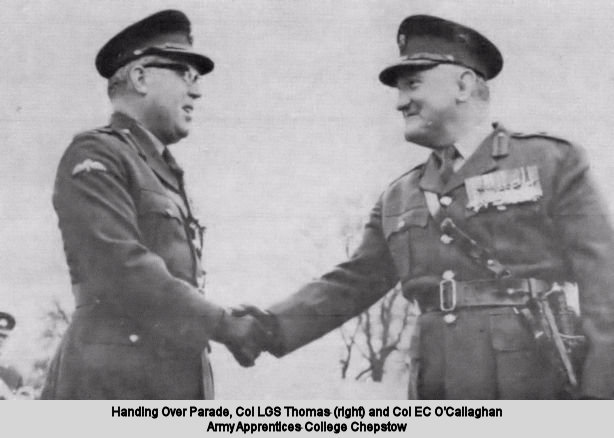 |
Eric's long and distinguished Military career came to its close in the early 1970s as Commandant of the Apprentices College at Chepstow where his example, high standards and guidance set many of the Corps' best tradesmen on the road to becoming fine SNCO's, Warrant Officers and Officers. |
In retirement Eric applied his enthusiasm and robust sense of humour to his new career as a financial advisor and he quickly demonstrated his ability and success here. He also devoted much time to keeping in touch with old friends and, in particular, to making sure that the sacrifices that young men of his generation made in WW2 were not forgotten. The men under his command that he had lost in action where never far from his mind and age did not dim his ability to list their names. He thought of them every day of his life. It was their loss, perhaps, that increased his determination to make the most of his life and his zest continued to the end.
In a life of memorable achievements Eric was most proud of having met and married Caroline at an age when most of his contemporaries were contentedly pruning their roses. To have their union blessed by two children in almost the twilight of his life filled him with indescribable pride.
A warrior, a raconteur and a caring, amusing father: this was Eric. To Caroline and his children Susan, Sarah, Victoria and Matthew we extend our sympathy. He will be greatly missed.
